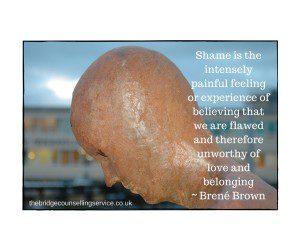I want to write about shame this month because it’s an emotion which is on my radar at the moment both personally and often comes into my counselling service here in Ipswich.
My relationship with shame is fairly new. That is to say being able to give a label of shame to the physical feeling is fairly new, but like many, if not most of us, I’ve experienced shame since I was a young child. In my body, I experience shame as a painful ache on one side of my chest accompanied by butterflies (the kind more often associated with your stomach). I often freeze or at least feel the need to be very still and if I’m alone, I’ll often cry, feeling deeply sad. Knowing what I’m feeling is shame enables me to not get as swallowed up by it and these days I tend to acknowledge and accept what’s happening even though it feels painful. Once the immediate feeling has passed, I like to get curious and reflect on what’s happened. Most often I can trace it to a sense of feeling unworthy – like I’m not good enough somehow. I can’t always go any further into it than that, but just knowing that a sense of unworthiness has surfaced is useful.
As anyone who follows my Facebook business page will know, I’m a big fan of Brené Brown and I’ve just finished reading her latest book Rising Strong. Brown differentiates shame from guilt by saying guilt is I DID something bad. Shame is I AM bad. These are two very different things and using this distinction has really helped me understand the difference. Guilt can be a driver to makes amends and do something different. Shame is toxic is offers nothing useful.
So what can you do when you get caught up in shame? Brown writes that the antidote to shame is empathy and from experience I agree with her. Can you recall the feeling of relief when in a moment of feeling bad about yourself, you reach out to someone, share how you’re feeling and receive a ‘me too’ or ‘yes, I know what you mean’ or ‘you’re not alone’? However, I’ve come to realise that not everyone is empathic – not even close friends or family who you love and who love you. I’m becoming much more selective with whom I share my shame stories because to feel judged, not understood or misunderstood adds another layer of shame, making climbing out just that bit harder. So who you tell matters greatly and I’d recommend you choose who you share your shame stories with wisely. Brown writes in Daring Greatly:
“Our stories are not meant for everyone. Hearing them is a privilege, and we should always ask ourselves this before we share: “Who has earned the right to hear my story?” If we have one or two people in our lives who can sit with us and hold space for our shame stories, and love us for our strengths and struggles, we are incredibly lucky. If we have a friend, or small group of friends, or family who embraces our imperfections, vulnerabilities, and power, and fills us with a sense of belonging, we are incredibly lucky.”
I’d add that we also need to hold space inside ourselves to be self-compassionate, especially when we’re feeling unworthy. If that sounds too soft or touchy feely then let me ask you this. If you have a friend who’s really struggling, would you suggest they need to pull themselves together or would you be kind and do your best to listen and be supportive? If you chose the first option you may have some work to do on yourself my friend but if you chose the second option, then this is what you need to offer yourself, in abundance, because I notice that we’re often a lot, lot harder on ourselves than we are on other people. Would you agree? I’d love to hear your thoughts about my blog post or about your experience with shame so if you have a comment, please use the box below.
Finally, if you’d like to understand more about shame I’d wholeheartedly recommend Brené Brown’s TED Talk Listening to Shame. It’s not only informative (and I would argue transformative) but she’s really funny too!

love this blog. I find it helpful talking to my mummy friends when I’ve lost my patience with the kids and they say “me too” but we do feel shame that we aren’t perfectly patient mums all the time x
Thanks for your comment Jane and it’s lovely to hear that you love my blog. I’m glad you can talk your mummy friends because the desire to be perfectly patient mums (all the time) is definitely an area where shame can rear its ugly head! I love the idea of being ‘good enough’. It removes the pressure of having to be perfect.
Very well said and its true we are often much harder on ourselves then we could ever be to others. An interesting topic, enjoyed reading it.
Thanks Laura. Glad you enjoyed reading it.